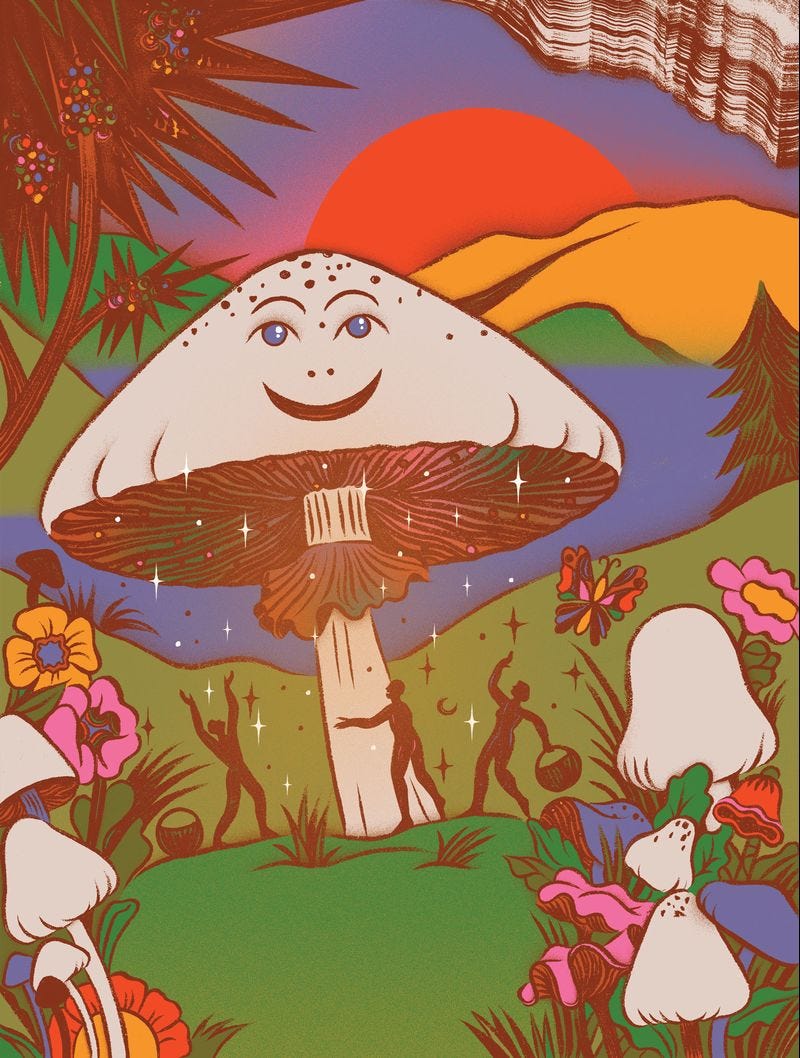THE BLACKMARKET IS BOOMING
The underground shroom economy is thriving thanks to new decriminalization laws
Hi guys! I recently published a feature on the psychedelic blackmarket—and how new laws decriminalizing trippy plants and fungi are driving underground business opportunities… including the advent of mushroom dispensaries, which is admittedly MIND-BLOWING to me. PEEP THE PIECE ON BLOOMBERG!
The feature is dripping with underground tea, starting with my recent reconnaissance to Vancouver, Canada—a wildly experimental zone where heroin and cocaine were recently decriminalized, fentanyl is sponsored by the government, and at least a half dozen illegal mushroom dispensaries are currently operating with relative impunity. God bless Canada!
After making my pilgrimage to the city’s first shroom shop, I sat down for a coca-laced cappuccino with the owner—a badass cannabis activist named Dana Larsen who told me he’s battling the courts to keep his business open, giving me this wild quote that “the drug dealers always win.” (Our full interview + my unvarnished take on the surreal shop will drop next week behind the paywall—support your fave gonzo drug Stack to sip that shroomy tea 😋)
Now let’s go behind the scenes of this story shall we?
A few months ago, I was at the California Psychedelic Conference, a groovy educational event led by Black-run collective Oakland Hyphae that features many BIPOC leaders of the psychedelic underground. There, my sis Shelby Hartman, editor-in-chief of Double Blind magazine, introduced me to Travis Tyler Fluck, a hardcore activist who helped to decriminalize shrooms in Denver. An earthy hippie with a formidable rat-tail, Fluck was griping about some dispiriting drama within the scene; namely that top-ranking government advisors overseeing Oregon’s newly-legal shroom therapy industry resigned after the revelation that they stood to profit from their own rules. Ew!
As we stood outside the conference on that balmy LA afternoon, I realized that the decentralized movement to decriminalize shrooms is winning groundbreaking legislative battles across the country, yet is vastly misunderstood. Most people on the streets (and even my most seasoned druglord friends) have no idea what psilocybin decriminalization really means—and how it is different from legalization—even though decrim bills have passed in many major cities like Washington DC, Seattle, Oakland, and Detroit. So I started digging around.
To put it simply: the current model for legalizing psychedelics creates a government-regulated industry centered around providing access to these medicines within controlled + therapeutic settings. Think: mushroom therapy centers where guides trained by MAPS hold your hand as you undergo trip sessions costing hundreds, if not thousands, of dollars. Oregon, which legalized shrooms in 2020, is pioneering this model; the first therapy centers will be awarded business licenses and begin operations next year.
On the other hand, decriminalization focuses on personal and ceremonial use of psychedelics, and usually reduces the penalty for possessing and growing shrooms from jail time to a small fine. While psychedelics are still technically illegal under this model, it de-prioritizes the enforcement of these laws to the lowest level of policing. Interestingly, many of the decrim activists I spoke to were part of the movement to legalize cannabis, and said that the perceived failures of that industry—where mom-and-pop businesses run by marginalized folks were squeezed out by VC-funded Big Weed—were a big motivator for doing things different. Thus, there is a sense within the scene that decrim is for the people, while legalization is for…. rich people.
Since this was a story for Daddy Bloomberg, my reporting also focused on the blackmarket business opportunities that decriminalizing psychedelics opens up. I heard all kinds of wild stories from my sources: pop-up night markets where shrooms and psychedelic plants are sold in industrial buildings for dirt cheap before everyone disappears by dawn; a psychedelic church in Oakland that my friend described as “basically a shroom dispensary;” a concert in LA where a huge rapper was giving away shroom chocolates to fans in exchange for buying merch (OK it was Wiz Khalifa LOL).
One theme kept recurring: decrim advocates staunchly believe that this incremental step towards legalization gives smaller businesses and individuals a crucial advantage in an industry that could soon be swallowed by Big Pharma. The risk of operating in the blackmarket right now is just too great for larger corporations whose investors are reluctant to pour millions into the space, but as increasing numbers of normies read Michael Pollan and become interested in trying these substances, mom-and-pop brands + community healers + small-time growers are stepping in to fill the demand.
I’m not sure whether the future of psychedelic legalization will be less bleak than cannabis’, but this story made me believe more than ever that the underground shroom scene is gonna be POPPIN’ in the years to come. Subscribe for my shroom dispensary dispatch next week—more soon ;)



